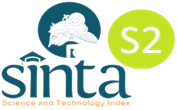PENGEMBANGAN LEMBAR KERJA SISWA (LKS) BERBASIS MODEL PEMBELAJARAN WE-ARe (Warm-Up, Exploring, Argumentation, Resume) DALAM MEMFASILITASI PENINGKATAN HASIL BELAJAR KOGNITIF SISWA KELAS XI SMA NEGERI 6 KOTA TERNATE
DOI:
https://doi.org/10.33477/bs.v12i2.5638Abstract
The objectives of this research include (1) determining the validity of worksheets based on the WE-ARe learning model for class XI students at SMA Negeri 6 Ternate City and (2) determining the effectiveness of worksheets based on the WE-ARe learning model in facilitating increased cognitive learning outcomes for class XI students at SMA Negeri 6 Ternate City. This research is development research with a research design adopting the Thiagarajan 4-D development model. The 4-D development model consists of defining, designing, developing, and disseminating. The results of the research show (1) the validity of worksheets based on the WE-ARe learning model was obtained on average in the very valid category; (2) LKS based on the WE-ARe learning model effectively facilitate the improvement of cognitive learning outcomes for class XI students at SMAN 6 Ternate City. The t test shows a sig (2-tailed) value of 0.003 0.05, so Hi is accepted and Ho is rejected. The conclusion of the research is that the use of student worksheets (LKS) based on learning models (WE-ARe) warm-up, exploration, argumentation, resumes can facilitate increased cognitive learning outcomes for class XI students at SMA Negeri 6 Ternate City.
References
Adiansyah, R., Amin, A.M., Yani, A., & Safitri, D. (2023). The Correlation between Metacognitive Awareness and Cognitive Learning Outcomes based on Gender of Biology Education Students. Biosfer: Jurnal Pendidikan Biologi, 16(2), 244-259. https://doi.org/10.21009/biosferjpb.26765
Agormedah, E.K., Ankomah, F., Frimpong, J.B., Quansah, F., Srem-Sai, M., Hagan, J.E & Schack, T. (2022) Investigating Teachers’ Experience and Self-Efficacy Beliefs Across Gender in Implementing the New Standards-Based Curriculum in Ghana. Frontiers in Education, 7, 1-12, 932447. doi: 10.3389/feduc.2022.932447
Ahmed, M. A., Lawal, A. A., & Ahmed, R. A. (2021). Influence of Teachers’ Self-Efficacy on Secondary School Students’ Self-Efficacy in Biology in Ogbomoso, Nigeria. JPBI (Jurnal Pendidikan Biologi Indonesia), 8(1), 58-64. https:// doi.org/10.22219/jpbi.v8i1.17231
Amin, A.M. (2022). Model WE-ARe dalam Tantangan Pembelajaran Abad 21. Akademia Pustaka. Tulungagung.
Amin, A. M., Majid, I., Hujjatusnaini, N., & Adiansyah, R. (2023a). The Correlation between the Character and Self-Efficacy of Pre-service Biology Teachers. Jurnal Penelitian Pendidikan IPA, 9(7), 5157–5162. https://doi.org/10.29303/jppipa.v9i7.2999
Amin, A.M., Karmila, F., Laode, Z.A., Hujjatusnaini, N., Adiansyah, R., & Abbas, A. (2023b). The Implementation of WE-ARe Learning Model toward the Critical Thinking of Pre-service Biology Teachers. Advances in Biological Sciences Research, 392-404. 10.2991/978-94-6463-166-1_50
Amin, A.M., Karmila, F., Laode, Z.A., Ermin. E., Akbar, A. Y., & Ahmed, M. A. (2023c). The WE-ARe model’s potential to enhance digital literacy of preservice biology teachers. JPBI (Jurnal Pendidikan Biologi Indonesia), 9(1), 36-45. https://doi.org/10.22219/jpbi.v9i 1.23061
Amin, A.M. & Adiansyah, R. (2023). The contribution of communication skills and digital literacy to students’ critical thinking skills. Formatif: Jurnal Ilmiah Pendidikan MIPA, 13 (2), 279-294. http://dx.doi.org/10.30998/formatif.v13i2.16525
Aurah, C.M. (2013). The Effects of Self-efficacy Beliefs and Metacognition on Academic Performance: A Mixed Method Study. American Journal of Educational Research, 1(8), 334-343. DOI:10.12691/education-1-8-11
Bandura, A. (2006). Article of guide for contructing self efficacy scales. By Information Age Publishing.
Cardenas, H. J., & Cerado, E. C. (2016). School climate, teachers’ efficiency and learning outcomes in koronadal city schools division, Philippines. Journal of Modern Education Review, 6(1), 19–25. https:// doi.org/10.15341/jmer(2155-7993)/ 01.06.2016/003.
Harianja, R., Tampubolon, T., & Manalu, L. (2023). Analysis of problem-based learning model on mathematical critical thinking skills of elementary school students. Formatif: Jurnal Ilmiah Pendidikan MIPA, 13(1), 101–108. https://doi.org/http://dx.doi.org/10.30998/formatif.v13i1.17251.
Maqvira. (2020). Pengembangan LKS Berbasis Pendekatan Saintifik pada Materi Sistem Pencernaan Manusia Kelas VII SMP Muhammadiyah Ambon. Institut Agama Islam Negeri (IAIN) Ambon.
Ningsi S & Afriani, W. (2019). Pengembangan LKS Biologi Berbasis Inkuiri Terbimbing Materi Sistem Regulasi, Jurnal Pendidikan Biologi dan Sains, 2(1), 50-59. https://doi.org/10.31539/bioedusains.v2i1.618
Nurwendah, W., & Suyanto, S. (2022). Relationship among Self-Motivation, Self-Efficacy and Achievement of High School Student in Biology. IOP Conference Series: Journal of Physics: Conference Series 1233, 012009, doi:10.1088/1742-6596/1233/1/012009
Ongowo, R. O., & Hungi, S. K. (2014). Motivational Beliefs and Self-Regulation in Biology Learning: Influence of Ethnicity, Gender and Grade Level in Kenya. Creative Education, 5, 218-227. http://dx.doi.org/10.4236/ce.2014.54031
Schunk, D. H., & Pajares, F. (2002). The Development of Academic Self-Efficacy. In A. Wigfield & J. S. Eccles (Eds.), Development of achievement motivation. Academic Press.
Suarniti, L. (2023). Supervisi Akademik untuk Meningkatkan Keterampilan Mengajar Guru SD. Journal of Education Action Research, 7(2), 280-287. https://doi.org/10.23887/jear.v7i2.59474
Tican, C., & Deniz, S. (2019). Pre-Service Teachers’ Opinions about the use of 21st Century Learner and 21st Century Teacher Skills. European Journal of Educational Research, 8(1), 181–197.
Toharudin, U., Rahmat, A., & Kurniawan, I. (2019). The Important of Self-Efficacy and Self-Regulation in Learning: How Should A Student be? IOP Conf.Series: Journal of Physics: Conf.Series, 1157(022074), 1–7. https://doi.org/10.1088/17426596/1157/2/022074.
Warsita, B. (2018). Teori belajar Robert M. Gagne dan Implikasinya pada Pentingnya Pusat Sumber Belajar. Jurnal Teknodik, 12(1), 64-78. doi:10.32550/teknodik.v12i1.42
Downloads
Published
Issue
Section
License
Authors who publish with this journal agree to the following terms: Authors retain copyright and grant the journal right of first publication with the work simultaneously licensed under a Creative Commons Attribution License that allows others to share the work with an acknowledgement of the work's authorship and initial publication in this journal. Authors are able to enter into separate, additional contractual arrangements for the non-exclusive distribution of the journal's published version of the work (e.g., post it to an institutional repository or publish it in a book), with an acknowledgement of its initial publication in this journal. Authors are permitted and encouraged to post their work online (e.g., in institutional repositories or on their website) prior to and during the submission process, as it can lead to productive exchanges, as well as earlier and greater citation of published work.














